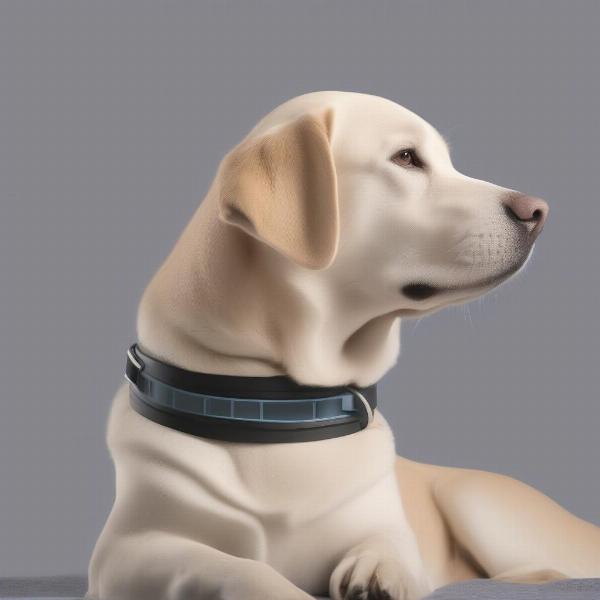Swelling after neuter dog is a common concern for pet owners. Neutering, also known as castration, is a surgical procedure that involves removing a male dog’s testicles. While generally safe, some post-operative swelling is expected. This article will cover what’s considered normal swelling after neutering, potential complications, and when to seek veterinary attention.
Understanding Post-Neuter Swelling
After your dog’s neuter surgery, some degree of scrotal swelling is perfectly normal. This is a natural inflammatory response to the incision and tissue manipulation. The swelling might appear as a firm, slightly warm, and possibly discolored area. Don’t panic! This initial swelling typically subsides within a few days to a week.
However, it’s crucial to differentiate between normal post-surgical swelling and signs of complications. Excessive swelling, accompanied by redness, heat, discharge, or a foul odor, could indicate an infection or other problems.
When to Worry: Signs of Trouble
While some swelling after neuter dog surgery is to be expected, certain signs warrant immediate veterinary attention. These include:
- Excessive swelling: If the swelling continues to increase or becomes significantly larger than the initial post-surgical size.
- Pain: If your dog exhibits signs of pain, such as whining, whimpering, or reluctance to move.
- Discharge: Any pus, blood, or other discharge from the incision site.
- Redness and heat: Significant redness and heat around the incision, beyond what’s expected in the initial healing phase.
- Lethargy: If your dog becomes unusually lethargic, refuses to eat, or shows other signs of illness.
- Fever: If your dog develops a fever.
If you notice any of these symptoms, contact your veterinarian immediately. Early intervention is key to preventing further complications.
Managing Post-Neuter Swelling
Your veterinarian will likely provide post-operative care instructions to manage swelling and discomfort. These may include:
- Keeping the area clean and dry: This helps prevent infection.
- Restricting activity: Limiting your dog’s movement, especially jumping and running, can help minimize swelling and prevent the incision from opening. dog surgical recovery suit
- Administering pain medication: Your veterinarian may prescribe pain medication to keep your dog comfortable. swelling after neutering dog
- Using an Elizabethan collar (e-collar): This prevents your dog from licking or chewing at the incision site, which can introduce bacteria and delay healing.
 Dog Wearing E-Collar After Neutering
Dog Wearing E-Collar After Neutering
Following these instructions diligently can help minimize swelling and promote a smooth recovery. how soon can i walk my dog after neutering
Conclusion
Swelling after neuter dog procedures is a normal part of the healing process. By understanding what’s considered typical swelling and recognizing the signs of potential complications, you can ensure your dog recovers comfortably and safely. Don’t hesitate to contact your veterinarian if you have any concerns about your dog’s post-neuter recovery. what is it called when a female dog gets fixed
FAQ
- How long does swelling last after neutering a dog? Swelling typically subsides within a few days to a week.
- Is it normal for my dog to be lethargic after neutering? Some lethargy is normal in the first 24-48 hours, but prolonged lethargy warrants a call to the vet.
- When should I remove my dog’s stitches after neutering? Your veterinarian will schedule a follow-up appointment to remove stitches, usually 10-14 days after surgery.
- What can I do to help my dog feel more comfortable after neutering? Provide a quiet, comfortable resting area, administer pain medication as prescribed, and follow your veterinarian’s post-operative care instructions.
- Can I bathe my dog after neutering? Avoid bathing your dog until the incision has completely healed, usually about two weeks after surgery.
- When can my dog resume normal activity after neutering? Your veterinarian will advise you on gradually increasing your dog’s activity level, typically over a period of several weeks.
- What should I do if the swelling doesn’t go down? Contact your veterinarian immediately if the swelling doesn’t improve or worsens.
ILM Dog is your trusted source for expert advice on dog care and wellbeing. We offer a wide range of resources, from breed selection and health care to training and nutrition. Our team of experienced professionals is dedicated to providing you with the information you need to keep your canine companion happy and healthy. Contact us today for all your dog-related questions and concerns. Email: [email protected], Phone: +44 20-3965-8624. Learn more about us at ILM Dog.